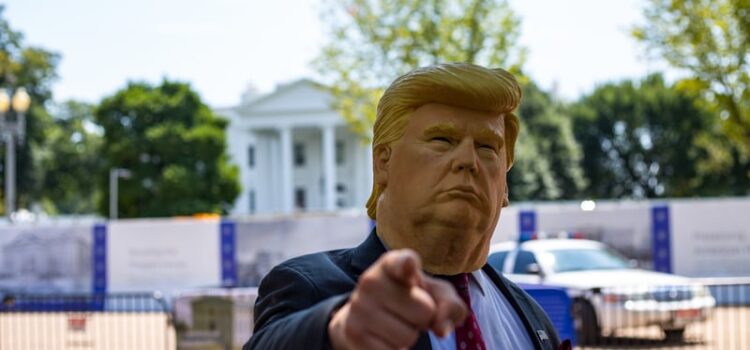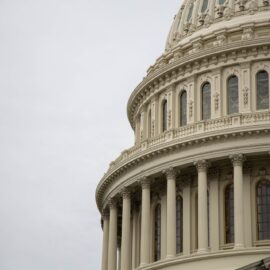

This article is an excerpt from the Shortform book guide to "Win Bigly" by Scott Adams. Shortform has the world's best summaries and analyses of books you should be reading.
Like this article? Sign up for a free trial here .
What do you think is the secret behind Donald Trump’s success in politics? How has he amassed so many supporters in spite of the public criticism?
Many would say that Donald Trump doesn’t know what he is talking about. But according to Scott Adams, Donald Trump is a masterful communicator as far as his persuasion factor goes: he knows what to say and how to say it.
In this article, we’ll take a look at Scott Adams’s analysis of Donald Trump’s campaign tactics which stand behind his election victory.
Notes on the 2016 Election
During the 2016 US Presidential elections, at a time when pundits had Trump at 2% likelihood of winning, Dilbert creator Scott Adams predicted that Donald Trump would win—primarily because of his persuasive power. According to Adams, what looked to outsiders like blunders or mere accidents – his “Rosie O’Donnell” debate response, nicknames like “Crooked Hillary,” the repetition of building “the wall”—was instead examples of a Master Persuader channeling a nation’s energy to help his candidacy.
Here are a few examples of DonaldTrump using multiple persuasive tools together in a single response.
Rosie O’Donnell
In a debate, Megyn Kelly asked, “You’ve called women you don’t like ‘fat pigs,’ ‘dogs,’ ‘slobs,’ and ‘disgusting animals’…” Trump interrupted, “Only Rosie O’Donnell.” The crowd laughed and applauded. When Kelly finished the question, Trump continued with an answer about the problem of political correctness.
Here are the persuasive tactics Trump used, in just 3 words:
- Visual image – Rosie O’Donnell was a recognizable image, especially for people who disliked her.
- Pacing and leading – he knew his base detested O’Donnell for her outspoken liberal views, so the image was triggering
- High-ground maneuver – instead of apologizing for his remarks, he took to the high ground on the destructiveness of political correctness. This neutralized the question so that his seemingly insulting comments no longer mattered.
- Get people talking – the quip was so novel and interesting to ignore, the attention focused on him other than his 16 competitors.
Scott Adams considers this response a masterful move. Trump “converted Kelly’s attack into pure energy” and harnessed that energy for his own purposes.
Pope
Trump was asked a question about the Pope’s criticism of capitalism.
Engaging on this level was a lose-lose – if he agreed with the Pope he would be against capitalism; if he disagreed, he would risk offending religious people. Either way, this would be boring.
Trump responded that he would tell the Pope that ISIS is coming to get him, and they have plans to take over the Vatican. This is a tremendous visual image, and it completely changes the topic.
On Trump’s Campaign Tactics
For some critics, Trump’s lack of specificity on his policies was maddening. But for his supporters, this was fine – he matched their overall priorities, and supporters trusted him to get the details right once elected.
According to Scott Adams, Donald Trump would drift back to the middle once elected, so he wasn’t concerned about Trump’s actual policies.
During the election, a wide range of issues was discussed, and Trump endured endless criticism. While this in total might have seemed to sink Trump, in reality the average person can hold only a handful of issues in her mind. Any less important topic fades from memory. All that she would remember is a general impression, that Trump didn’t apologize and his opponents called him a liar, like always.
Reflections on Trump’s Scandals
Trump had a number of scandals during the campaign, and while liberals hoped each one would sink Trump, they rarely had the impact hoped.
Scott Adams reflects on the impact of each scandal.
Trump’s Taxes
- Releasing taxes was a losing situation if he had truly scandalous things in it. It’d invite endless scrutiny that he’d have to defend. Since most voters aren’t versed in accounting, mountains might be made of molehills.
- In this case, it was better for opponents to imagine problems than for Trump to face them head-on.
- Trump’s missing taxes invoked little visual imagery and fear, so the persuasive impact was likely low.
KKK Slow Denial
- In an interview on CNN, Trump was asked about KKK grand wizard David Duke and whether he would explicitly say he didn’t want the votes of white supremacists. Trump hemmed and hawed, saying he didn’t know much about David Duke and would have to look more into it. Trump later said he had earpiece trouble that explained his confusion.
- Given that Trump had previously disavowed support of the KKK and did so a day after the interview, Adams believe there was some chance Trump actually had earpiece trouble. But this was a clear persuasive error.
- If it was strategic, Trump may have been simply waiting until the last moment to dissociate from a possible ally.
- Adams considers this the biggest error in the campaign, as it fed the narrative of him as a dark racist.
Judge Curiel
- A lawsuit against Trump University reached a court whose judge was of Mexican heritage. Trump said he wasn’t sure the judge could be impartial because she was Mexican. Trump explained that he meant the judge that because of Trump’s illegal immigration policies, the judge would indirectly be biased.
- Taken least graciously, Trump was literally saying that Mexican judges couldn’t be objective.
- Adams considers this a win-win. After his (clumsy) statement, the judge would either rule against Trump and he would seem validated; or the judge would overcorrect for the bias and allow the extension Trump sought, which would remove the toxic Trump U from the election cycle.
Khan Controversy
- At a DNC convention, a Muslim lawyer talked about his son who died in the military. When asked about the speech, Trump wondered why his wife stood silently on the stage and implied that Muslim convention stifled female speech.
- Trump was painted as anti-veteran and a xenophobe. In his favor, this might have triggered fears of outside beliefs becoming dangerous for domestic women.
- Adams believes this was a small negative for Trump, if not neutral. He had done enough to support veterans in the past that he couldn’t commonly be seen as anti-veteran.
Pussygate
- When Trump was preparing for a TV show, he said to the host, “when you’re a star, they [women] let you do it, you can do anything… grab them by the pussy.”
- This was bad for Trump. It had a strong visual element and fed his reputation as a dark sexist.
- But as a silver lining, it actually softened his Hitler image – he got promoted to an ordinarily flawed guy engaging in some lewd talk. And he already had some element of a “bad boy” image, so it wasn’t as shocking than if he’d presented himself as an angel.
Reflections on Clinton’s Scandals
“Basket of deplorables”
- Clinton said half of Trump’s supporters were “racist, sexist, homophobic, xenophobic…a basket of deplorables.” Trump said this pointed to her “true contempt for everyday Americans.” Adams considers Trump’s choice of the word “contempt” as ideal, much better than “awful, inappropriate, sick,” etc.
- This furthered the perception that Clinton was fighting for her team and not for all of America. It rallied Trump supporters who were tired of being attacked for being racists when they were primarily interested in his character and politics.
Wikileaks, Comey, Email server
- Clinton used a private email server as Secretary of State, leading to a series of related allegations involving impropriety around information – DNC emails showing a shared debate question, Anthony Weiner’s laptop.
- All of this virtual tech stuff got conflated and gave the impression that something just wasn’t quite right – where there’s smoke, there’s fire. This also fit the confirmation bias of “Crooked Hillary.”
- While many might have pointed to this as a reason to vote for Trump, Adams believes that this was a “fake because” – Trump voters had made up their minds, and this was just an excuse for them to declare support for Trump.

———End of Preview———
Like what you just read? Read the rest of the world's best book summary and analysis of Scott Adams's "Win Bigly" at Shortform .
Here's what you'll find in our full Win Bigly summary :
- The persuasion tactics Donald Trump used throughout the 2016 presidential campaign
- Why Hillary Clinton's campaign fell short
- How to leverage people’s biases and irrationality to persuade on your point of view






